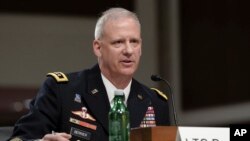ບັນດາເຈົ້າໜ້າທີ່ສືບລັບຂັ້ນສູງຂອງສະຫະລັດ ໝັ້ນໃຈວ່າ ອັງການຂອງຕົນ ຈະບໍ່ຕົກເປັນເຫຍື່ອຂອງຄວາມຜິດພາດແບບດຽວກັນທີ່ເຮັດໃຫ້ ສະຫະລັດ ຕັດສິນໃຈຜິດພາດກ່ຽວກັບຄວາມຕັ້ງໃຈຂອງກອງທັບພັນທະມິດທັງຫຼາຍ ແລະ ຂອງພວກສັດຕູໃນຊຸມປີທີ່ຜ່ານມານີ້.
ໜ່ວຍສືບລັບຂອງສະຫະລັດໄດ້ຖືກຕ້ອງຕິຢ່າງແຜ່ຫຼາຍສຳລັບການປະເມີນຄ່າ ສູງເກີນໄປໃນອັນທີ່ເອີ້ນວ່າ “ຄວາມຍິນດີທີ່ຈະຕໍ່ສູ້” ຂອງກອງທັບອັຟການິສຖານ ຊຶ່ງໄດ້ລົ້ມສະຫລາຍໃນຂະນະທີ່ກອງກຳລັງສະຫະລັດ ຖອນກຳລັງອອກ ຈາກປະເທດດັ່ງກາວ ແລະສຳລັບການປະເມີນຄ່າຕ່ຳເກີນໄປ ສຳລັບຄວາມ ອາດສາມາດຂອງກອງກຳລັງຢູເຄຣນ ທີ່ຈະຢຸດຢັ້ງການບຸກລຸກຂອງຣັດເຊຍ.
ແຕ່ຜູ້ອຳນວຍການອົງການສືບລັບດ້ານການປ້ອງກັນປະເທດ ທ່ານ ສະກັອດ ແບຣີເອີ ໄດ້ກ່າວຕໍ່ຜູ້ຟັງ ໃນວັນພຸດວານນີ້ວ່າ ທ່ານໝັ້ນໃຈທີ່ການປະເມີນຜົນ ກ່ຽວກັບ ການຂະຫຍາຍຕົວຂຶ້ນນັບມື້ຂອງຂອງກອງທັບຈີນ ຈະມີຄວາມແນ່ນອນ.
“ດ້ວຍການເຕີບໃຫຍ່ຂະຫຍາຍຕົວຂອງກອງທັບສາທາລະນະລັດປະຊາຊົນຈີນ ຈາກທົ່ວທຸກບ່ອນ, ພວກເຮົາໄດ້ຕິດຕາມເບິ່ງມັນ ເປັນເວລາຫ້າຫຼືຫົກປີທີ່ຜ່ານ ມາດ້ວຍຄວາມເອົາຈິງເອົາຈັງໃນລະດັບສູງ” ທ່ານແບຣີເອີ ໄດ້ກ່າວໃນລະ ຫວ່າງການສົນທະນາ ຢູ່ທີ່ສູນກາງການສຶກສາແຜນຍຸດທະສາດ ແລະ ສາກົນ ໃນນະຄອນຫຼວງວໍຊິງຕັນ.
ທ່ານກ່າວອີກວ່າ “ຂ້າພະເຈົ້າຄິດວ່າ ພວກເຮົາມີທັດສະນະທີ່ແຕກຕ່າງກ່ຽວກັບສິ່ງນີ້. ພວກເຮົາຮູ້ດີວ່າ ພວກເຂົາເຈົ້າກຳລັງດຶງເອົາ ຄວາມອາດສາມາດໃນ ຫຼາຍດ້ານມາເຂົ້າກັນ....ສະນັ້ນພວກເຮົາຕ້ອງເບິ່ງພວກເຂົາເຈົ້າຢ່າງລະມັດລະ ວັງແທ້ໆ ໃນຂະນະທີ່ພວກເຂົາເຈົ້າສືບຕໍ່ຂະຫຍາຍຕົວແລະພັດທະນາ.”
A top U.S. intelligence official is confident his agency will not fall victim to the same mistakes that allowed the United States to misjudge the military will of allies and adversaries in recent years.
U.S. intelligence has been widely criticized for overestimating the "will to fight" of the Afghan military, which collapsed as U.S. forces were withdrawing from the country, and for underestimating the ability of Ukrainian forces to hold off the Russian invasion.
But Defense Intelligence Agency Director Scott Berrier told an audience Wednesday that he was confident the assessment of China's growing military would hit the mark.
"With the growth of the PRC [People’s Republic of China] military across all spectrums, we have had our eye on this for the last five or six years with a high degree of intensity," he said during a talk at the Center for Strategic and International Studies in Washington.
"I think we're taking a different view of this," he said. "We know that they are pulling together a lot of capabilities … so we have to watch them very, very carefully as they continue to grow and develop."




